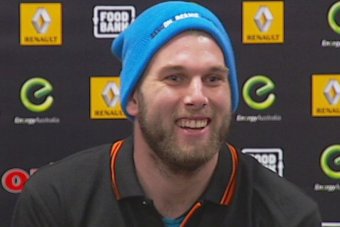A large proportion of the general public is still unaware of the amount of people affected by brain injury, Port Power AFL player Jackson Trengove says.
The Brain Injury Awareness (BIA) week ambassador said that while brain injuries and concussion had become a hot topic of discussion in AFL circles in recent years, the general public remains largely in the dark.
“Whether it’s sport related or car accidents … whatever it may be,” Trengove said.
Australian Bureau of Statistics numbers shows more than 700,000 Australians have a brain injury that causes daily “activity limitations” and “participation restrictions”.
Three in four of these people are under 65 and two in three acquired the injury before they were 25.
BIA said people with a brain injury could experience changes in physical and sensory abilities, in their ability to think and learn, in behaviour and personality, and could experience communication and medical difficulties.
No one would have realised that in the community, one in 12 Australians have an ABI. To know there’s hope and raising awareness is extremely important.
BINSA CEO Nahtanha Davey
Trengove, 24, said he was fortunate to have never dealt with a brain injury firsthand, but has seen the short term repercussions of concussions from his teammates during matches.
“Over the past couple of years … there’s been a bigger emphasis on brain injuries in our sport,” he said.
“It’s obviously a big thing in AFL, and I think we’re doing a really good job of preventing as many brain injuries as possible.”
The AFL has implemented rules that force players off the ground when a player loses consciousness, or are “rag-dolled and floppy” when they hit the ground.
Other major football codes across Australia, including the National Rugby League, as well as those worldwide, have adopted similar policies as sporting administrators battle with how best to handle brain-injury related risks of contact sports.
Trengove has been an ambassador for BIA for three years.
He said that while awareness was increasing, BIA still did not have the same level of support as other charities.
The search for brain injury support
There is no legislated form of assistance available for brain injuries in Australia like those that exist for mental illnesses.
What is a brain injury?
- The experts use three terms — head injury, acquired brain injury (ABI), or acquired brain damage (ABD).
- Head injuries, ABI or ABD can be caused through an accident, stroke, alcohol or drug abuse, tumours, poisoning, near drowning, haemorrhage and other disorders.
- Brain injuries can vary widely from person to person so treatment will largely depend of the nature and severity of the injury.
People who suffer a serious brain injury and lack a social network of friends and family are often forced to use services and facilities designed for other illnesses and injuries.
Support networks like the Brain Injury Network of South Australia, the state’s peak service, offer a number of services aimed at helping people deal with and recover from Acquired Brain Injury (ABI).
BINSA chief executive officer Nahtanha Davey said there were many people in the public eye who had ABI who still lived a rewarding life, including United States actress Sharon Stone.
“No-one would have realised that in the community, one in 12 Australians have an ABI,” she said.
“It’s a significant number.
“To know that there’s hope and raising awareness is extremely important.”
She said BIN offered a number of services aimed at helping people deal with and recover from ABI.
“Every day we see amazing stories of rehab,” Ms Davey said.
“It takes time … but I am absolutely amazed at the wonderful stories that I see and the inspiration and their motivation after their rehabilitation.”
The national Brain Injury Awareness week runs until August 23.

